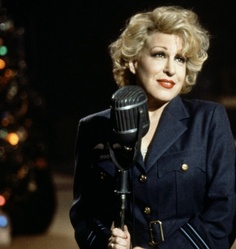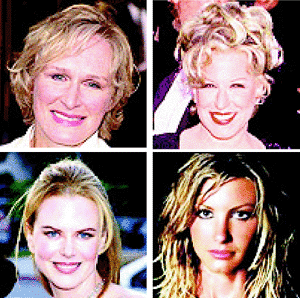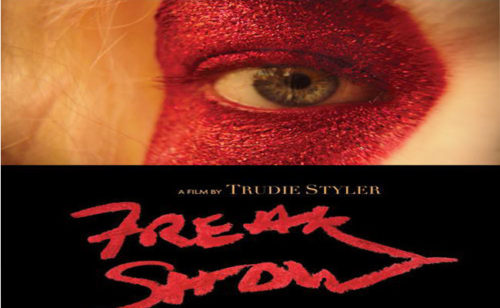Lima News
November 29, 1991
Smearing half a century of American history across the screen like cream cheese on a bagel, “For the Boys” has heart and cheek, maybe even a little bit of bite. But don’t hold your breath for any sign of a brain.
It’s the story of a song-and – dance duo who entertain the troops in three wars, as if Bob Hope had metamorphosed into Fred and Ginger and Burns and Allen. Except in this case, it’s Bette Midler and James Caan as Dixie Leonard and Eddie Sparks, who carry on their own war for 50 years while catching fire on stage.
Midler is fabulous, first as the saucy youngster who gets a break when she’s invited to appear at a USO show with the great Eddie Sparks, then as a tough trouper doing the Korean and Vietnam wars. The duo fills in their time between battles with live television, a battle of another kind.
The story is told in flashback by a bitter old woman explaining why she will not join her former partner on stage one more time at a tribute to accept a presidential medal.
It’s understandable. Besides the trauma of the past 50 years – and Dixie has suffered much for her country – anybody with a latex makeup job as bad as the aged Dixie’s ought not to be seen in public. It’s as an old woman that we first meet her, and the phony makeup is distracting. Different lighting might have helped.
But once Midler sheds the extra skin and the very effective elderly act, she’s radiant Midler fans will love not only the cocky, wisecracking Bette belting out her songs, but the tender Bette who fioats a ballad across a stinking battlefield and cares more about her son than about any man. In fact, it’s the son growing up that marks the passing of time between wars.
Throughout, we’re meant to be teased by the possibility of the sparks between Eddie and Dixie fiaring into passion offstage. But Dixie is such a force in herself that we never really feel she needs this guy, especially this guy Early on Dixie describes the great Eddie Sparks as “generous, stingy, infuriating, brilliant.” But Caan gives us only a petty nastincss and weariness. Not for a moment is there a hint of a charismatic superstar or a man equal to Dixie. Spencer Tracy and Katharine Hepburn they ain’t.
But while the romantic tension between the two stars that ought to propel this movie is wholly absent, the remarkable thing is that it’s not sorely missed. And give these filmmakers credit for not forcing a full-blown love affair.
Instead of sex, this movie has a huge, generous heart that wants to be loved back and never stops trying and giving.
Here a song, there a tear, here a bomb (literally and figuratively), there a laugh. The movie practically encourages us to laugh not only with it, but at it. And there’s a scene of war violence and broken bodies to make you flinch.
“For the Boys” is so honest about wanting to entertain, to wrench, to make you laugh and cry not a little, that you don’t begrudge either or complain about what it doesn’t do.
Even more remarkable is how Midler transcends the material that on the whole is really little more than a fast-forward ride through a theme park of recent American history. We’re still in Korea , for example , when Dixie’s Uncle Art, the writer for the pair, is blacklisted. The blacklisting is “a bloodbath.”
Korea is “a crazy” war. Vietnam is “a nightmare.”
But the writers, including Marshall Brickman (a former writing partner of Woody Allen), also manage to salt the all-American pop corn with some sharp humor. Much of it is directed at show biz and television, with several scenes set in a studio control room.
For director Mark Rydell, whose previous work includes “The Rose” with Midler and “On Golden Fond,” and especially for Midler, whose All Girl Production company made the movie after considerable effort, the finished product is a victory, though not cxactly a triumph, of heart over head, a movie that’s somehow a little bigger and a little better than the sum of its parts.







